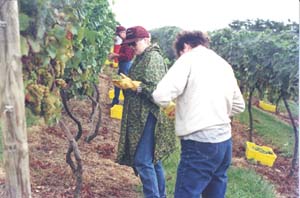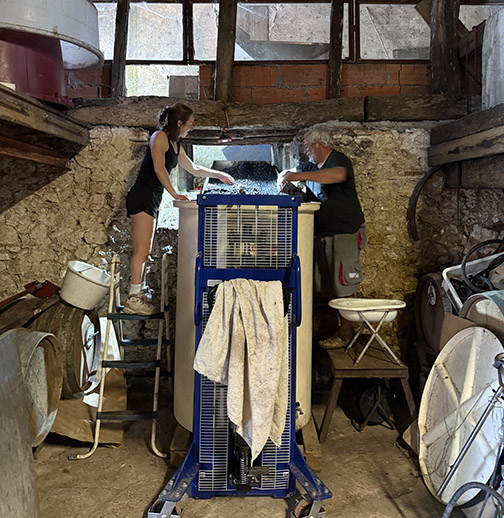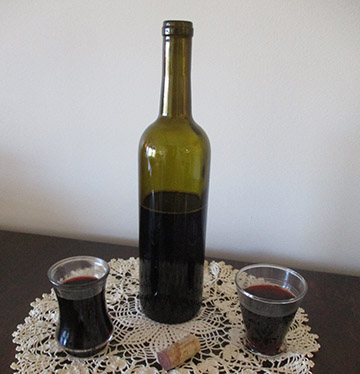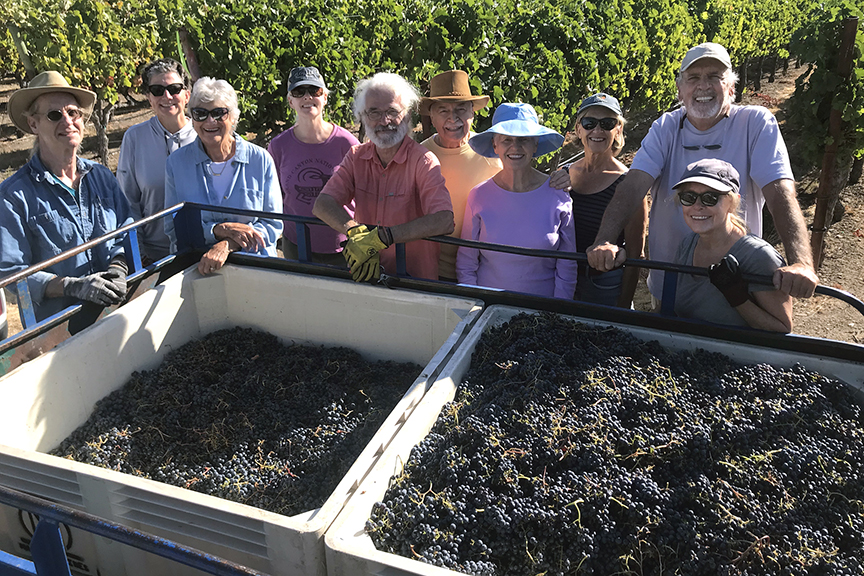Hobby Harvest

When Philip Hanyok pulled up to Melancy Hilltop Vineyards in Perry County, Pennsylvania, early last October, he found Mel Heffley, the vineyard’s owner, already deep in discussion with another home winemaker. Heffley quickly turned his attention to Hanyok, however, as he stocked him up with lined crates and a finger trimmer. After Heffley had showed Hanyok how to use the little blade to shear away clusters of grapes, he took him out among the vines, pointed out the Riesling-like hybrids Hanyok was looking for and let him go to work.
“I like using grapes because it’s a direct line,” Hanyok says of his day in Heffley’s vineyard, his first experience picking grapes. “The neat thing with grapes is you are out there experiencing the full circle.”
Once Hanyok had gathered his nearly 200 pounds (91 kg) of white wine grapes — far more than he had planned to pick or really needed — the true learning process began. Heffley used a small trailer on his riding lawnmower to haul the full crates to his crusher/destemmer, where Hanyok helped process his own grapes. After showing Hanyok how to work the crusher/destemmer, Heffley explained why the first pressing with his large bladder press provides the best quality juice.
A Learning Experience
“In the few hours I spent with him, I learned more than I would have learned from reading a book for the same time,” Hanyok says.
Kim Kaufell, a teacher whose husband and young daughters help her pick wine grapes, also appreciated the unassuming, one-on-one counseling Heffley gave her.
“I didn’t feel scared to ask him things,” Kaufell says of Heffley, who helped her find a red and white grape to accomodate her preferences when she picked at his vineyard last year. Then, while Kaufell frantically jotted down notes, Heffley advised her about fermenting the juice and must.
“I just prefer small-time vineyards,” she says. For Kaufell, who grew up watching her father make his own wine, picking her grapes was not only a learning experience, but also a way to pass her heritage on to her daughters.
It is this hands-on experience and first-hand advice that draws many home winemakers to small, non-commercial vineyards like Heffley’s. And it is a similar desire to share the tricks of the trade that compels amateur winemakers with burgeoning vineyards to make the fruits of their labors available to fellow hobbyists.
Helpful Hobbyists
“What amazes me with talking to all these different winemakers is all their different philosophies of winemaking,” Heffley says. “I learn as much from them as they do from me.”
Green-thumbed home winemakers from coast to coast have started selling their grapes as Heffley does, demonstrating the latest length to which these hobbyists have gone for the sake of the winemaking community.
According to a survey conducted by WineMaker magazine 67% of its readers are currently growing or planning to grow their own grapes. And small vineyards like Heffley’s have decided to go a step beyond that by offering their bounty to other home winemakers in an arrangement that benefits them both — the buyers are included in the full winemaking “circle,” while helping to offset the costs and work of running a growing vineyard. And both grape buyers and sellers say picking day at these vineyards is a great opportunity for winemakers to share important information.
More Than Most Amateurs, but Not Quite Professional Scale
Although these grape growers occasionally deal with commercial wineries, they prefer to keep their vineyards small – though not always as small as they would like. As Heffley and other small vineyard owners have discovered, once amateur winemakers find a reliable source for reasonably priced grapes, they are determined not to lose it. And because these vineyard owners are also fellow winemakers, their customers are more loyal than usual. By intimately understanding the trials and tribulations of making wine at home, these vineyard owners can accommodate their customers’ needs in a way commercial wineries may never be able to. Take, for example, the professional-size crusher/destemmer and bladder press Heffley provides for his grape buyers’ use.
“Most of them have several years’ experience, they’ve handpicked grapes off the stems and they don’t want to do that again,” Heffley says of the extra five cents per pound he charges for processing with each piece of equipment. “They don’t even hesitate.”
Heffley, a semi-retired contractor, has had his 2.5-acre vineyard for 10 years. He tells a familiar story about deciding a few years ago to allow home winemakers to pick and process grapes at his vineyard.
In 1999 Heffley decided his vines were producing enough that he could open a small winery on his property. He had the paperwork completed when a friend advised him to consult local residents at a township meeting before he started counting his chickens. Sure enough, the township stopped short of telling Heffley “no” outright, but made it clear there would be overwhelming opposition to his winery.
“So now I had too many grapes and couldn’t open the winery,” Heffley says. “I thought, what am I going to do?”
Heffley came up with the same answer many small vineyard owners – sell the grapes.
Knowing there was a significant demand for wine grapes in his area of Pennsylvania, Heffley put ads in local papers and winemaking shops offering “pick-your-own” grapes and the use of his crusher/destemmer and bladder press. The response was promising, but that year’s grape crop wasn’t. Heffley’s grapes were almost entirely wiped out by a late spring frost. His vines recovered, though, and by two years later Heffley sold about 9,700 pounds (4,400 kg) of grapes to more than 30 home winemakers. He has also sold to professional wineries on occasion, but was frustrated with the results.
“With some grapes they’ll take everything I have,” he says. “And hey, I want some of that myself.”
Rick Buffington, who owns a software company as well as a small vineyard in Fallbrook, California, has also considered selling his grapes to a nearby professional winery. Although this is the first year his grapes are ready for sale, the winery has already expressed interest in Buffington’s relatively rare Montepulcianos.
But Buffington’s Cougar Vineyards plans to sell most of its grapes to home winemakers – and mostly to members of Buffington’s winemaking club at first – with a picking and processing system similar to Heffley’s. The Buffingtons also plan to offer buyers the option to have their grapes picked by vineyard employees for an extra fee and to sell vine cuttings during the next pruning season. Like Heffley, Buffington didn’t start Cougar Vineyards planning to make millions selling grapes.
“We just liked the idea of having a vineyard,” says Buffington, who has been making wine with his wife, Jennifer, for more than 10 years. “It looks nice, but it got bigger than what we anticipated.” The Buffingtons planted their vineyard only two years ago so Rick doesn’t yet know how much money the grapes will garner, but he expects it to be similar to the avocados he sells from his property – they basically just pay for the water it takes to grow them.
“The money (from the grapes) will hopefully just pay for the chemicals, water and upkeep on the equipment,” Buffington says. “It’s not a big cash crop by any means.”
But it can provide Buffington and his buyers benefits beyond the monetary. He has control over what is put on the grapes and when they are harvested. And his customers are similarly assured that they are getting high quality, freshly picked fruit since they get to peruse the vineyard and pick the grapes themselves.
In Pennsylvania, a Big Little Vineyard
Another small vineyard owner and home winemaker, Don Gauntner, in Seven Valleys, Pennsylvania, has already arrived where Heffley and Buffington’s vineyard are headed. Gauntner has been selling grapes from his 4-acre Larue Vineyards for the past 17 years. But even though his customer base is stable and he has perfected most processes, Gauntner has also learned difficult lessons that still lie ahead of less experienced vineyard owners. He had problems with commercial wineries early on and no longer lets home winemakers pick their own grapes. They took only the best clusters and left his rows in disarray, Gauntner complains. he has also stopped selling to people from out of town because they frequently failed to show up on the arranged day.
Now home winemakers have to call and reserve their Larue grapes starting just after the previous year’s harvest; then they just show up on the appointed day and pay between $12 and $22 for each gallon of prepressed juice or must. Gauntner even has an agreement with a few local vineyards to bring in their grapes to process and sell when he gets more orders than he can accomodate. But processing about 20 tons of grapes for 50 to 60 customers a year is more work than Gauntner ever planned on – or necessarily wants.
Hard Work… but Rewarding
“Things have sort of gotten out of control,” Gauntner says. He would like to downsize, but his consumer base simply won’t let him. All Gauntner can do now is wait for his customers to start ordering fewer grapes.
“If you don’t like hard work, try a different daytime job,” Gauntner, who is a retired Army Colonel, warns vineyard owners who are considering following in his footsteps. Gauntner has learned first-hand that selling from a small, amateur vineyard can quickly become as much work as a full-time job. But he insists it can also provide as many – if not more – benefits.
“The person that starts out growing grapes usually turns commercial,” Gauntner says. “I refuse to go commercial.” With about $20,000 in equipment alone, it might seem that Gauntner is essentially already there. But what makes the difference is his frame of mind – he’s in it for the interaction with fellow home winemakers, not for the money they pay him.
“We like home winemaking people,” Gauntner explains. “Most all of our customers have become good friends, some close friends.”
Larue Vineyards even holds an annual event for its customers, complete with a guest speaker and wine competition. Gauntner says the pot luck dinner, which usually draws more than 100 winemakers and their families, is his way of telling them “thanks.”
“Being retired, we enjoy supporting the home winemaker in the endeavor to pursue a great and interesting hobby,” Gauntner says. “We want to help them enjoy the hobby.”
Miki Johnson, a senior at Northwestern University’s Medill School of Journalism, was an intern at WineMaker magazine this winter.
Hobby Vineyard Tips
Home winemaker Philip Hanyok plans to return to Melancy Hilltop Vineyards, where he picked and processed his own wine grapes last year – this time to learn pruning and vine maitenance techniques from Mel Heffley, the vineyard’s owner. He is even considering starting his own vineyard and selling pick-you-own grapes to other home winemakers. Here are the words of wisdom Heffley and small vineyard owners Rick Buffington and Don Gauntner have to Hanyok and other home winemakers who might want to join the grape-seller ranks.
Grow the grapes that best fit the needs of home winemakers
Gauntner suggests surveying the market to find what local customers are looking for and decide what grapes would be best for them.
Join a winegrowers group
Heffley relies heavily on advice from his fellow members of the Pennsylvania Association of Winegrowers for growing advice, but also warns growers that sometimes they will have to make their own decisions.
Keep orderly records
Buffington has been working with his software company to develop a vineyard management program that will help vineyards track the progress and health of individual plants as well as monitor and schedule chemical treatments.
Careful with those chemicals
You will almost surely want to get a pesticide license. Heffley studied a training manual from his county agricultural agent and was issued his license once passing a test. He must now earn additional credits each year to keep the license up-to-date. Most states have a similar application process.
Investigate agricultural discounts
In areas such as California, water can be one of a vineyard’s greatest expenses. Buffington suggests investigating agricultural discounts on water. To get his, he only had to fill out a simple form from the municipal water district saying he had more than an acre from which he was planning to sell produce.
Don’t forget the area around your equipment
All three growers have structures to protect their equipment (and the winemakers using it) from the elements: Heffley has a large tent while Buffington and Gauntner opted for permanent buildings. Water supply is also a must, possibly for a bladder press, but definitely for cleaning. Heffley says he spends at least two to three hours cleaning his equipment after all his customers have gone home.






